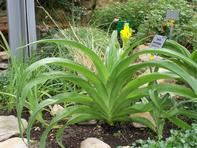Not related to the household potato, the African wild potato (Hypoxis hemerocallidea) is associated with the lily and is a very hardy and drought resistant plant native to South Africa. It grows in the summer rainfall regions of South Africa and has bright yellow star-shaped flowers with hairy leaves.

Benefits of African Potato
Traditional healers have used it as a muthi to treat delirium, ‘bad blood’ (in diabetes), PMS and as a parasiticide. Conventional uses include application of a deep penetrating ointment to treat symptoms associated with arthritis, psoriasis and fibromyalgia. It is also beneficial against skin conditions such as eczema, acne, scars, burns, rashes, bed sores, warts, stretch marks, sunburn, insect bites and dry skin.
The active ingredient, hypoxoside, is extracted from the tuberous rootstock. It has a high sterol and sterolin content which may possess potent anti-inflammatory and immune strengthening properties.
As the action is similar to cortisone it may reverse tissue damage and soothe muscular aches. It also acts as powerful antioxidant which may have an anti-ageing effect.
Theories have also suggested the African potato to be beneficial in the treatment of HIV/Aids, prostate cancer and Tuberculosis.